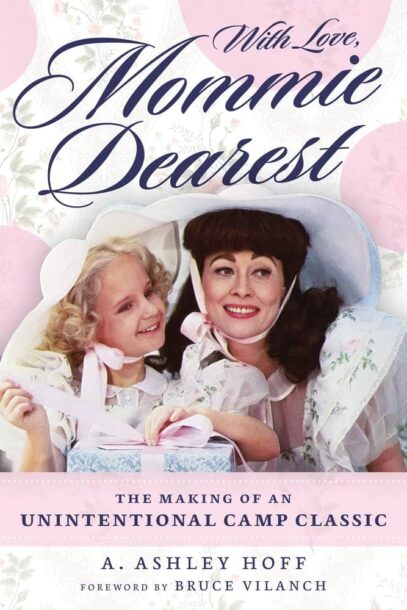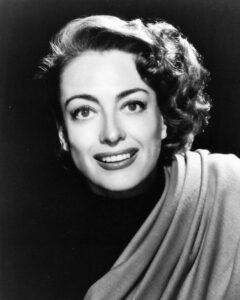By A. ASHLEY HOFF (Chicago Review Press; 2024)
This isn’t the first book about the making of MOMMIE DEAREST (1981), nor the best (both those designations go to 2015’s MOMMIE DEAREST DIARY by the film’s co-star Rutanya Alda), but author A. Ashley Hoff succeeds nonetheless in telling us everything we need to know about this “Unintentional Camp Classic.” It’s my contention that all true camp classics are unintentional (there are few things more insufferable than manufactured camp), and a large part of what makes MOMMIE DEAREST such dumb fun is the fact that its makers really believed they were crafting award-caliber cinema.
MOMMIE DEAREST (1981) Trailer
WITH LOVE MOMMIE DEAREST consists primarily of recollections by participants in the DEAREST debacle (including copious excerpts from the abovementioned Rutanya Alda diary). Among them is actress/author Christina Crawford, whose 1978 memoir about her abusive foster mother, the iconic Hollywood star Joan Crawford, inspired the flick. Involving Christina means Hoff is obliged to delve into the controversy surrounding her book, which has been contentious ever since its initial publication; nearly every person quoted in WITH LOVE, MOMMIE DEAREST is made to give their opinion on whether Christina fabricated the charges against her mother (leading, as you might guess, to much artful skirting of the issue).
Hoff also provides plenty on info on Joan Crawford’s life. He’s especially fascinated by a bizarre 1968 episode (dramatized in the film) in which the fiftyish Crawford substituted for 29-year-old Christina in the soap opera THE SECRET STORM when the latter required medical attention. Crawford’s motives in doing so—some claim she was trying to help Christina and others believe it was a desperate publicity grab—are argued over at some length.
But onto the filming of MOMMIE DEAREST, which was, unsurprisingly, a shitshow. Equally unsurprisingly, most of the major issues facing the production emerged from a single source: its star Faye Dunaway. To be sure, Dunaway’s impersonation of Joan Crawford was impressive, but her performance, presaging her work in THE WICKED LADY (1983) and SUPERGIRL (1984), was so insanely over the top it turned what was supposed to be a shocking expose into one of the decade’s most hysterical comedies. It certainly didn’t help matters that director Frank Perry was known for character-based fare like DAVID AND LISA (1962), LADYBUG LADYBUG (1963) and THE SWIMMER (1968), and so wasn’t at all suited to the type of operatic melodrama that characterized MOMMIE DEAREST. He was also in no position power-wise to reign in the excesses, on-camera and off, of his leading lady.
Hoff makes sure to speak with nearly every surviving member of the MOMMIE DEAREST cast and crew. One of the only non-forthcoming MOMMIE DEAREST alums is Ms. Dunaway, and no wonder: few of the interviewees have anything good to say about her (with the most effusive Dunaway praise coming from, ironically, Mara Hobell, who played the abused Christina) and she herself is said to be chagrined by the film.
Included is info on MOMMIE DEAREST’s theatrical release, in which the publicity campaign was dramatically altered after a week to reflect audience reaction. The film’s subsequent coronation as a camp classic and gay movie touchstone is also acknowledged, with writer/actor Bruce Vilanch, who Hoff uses as a spokesperson for gay America, getting a disproportionate share of ink despite having no direct involvement in the film.


